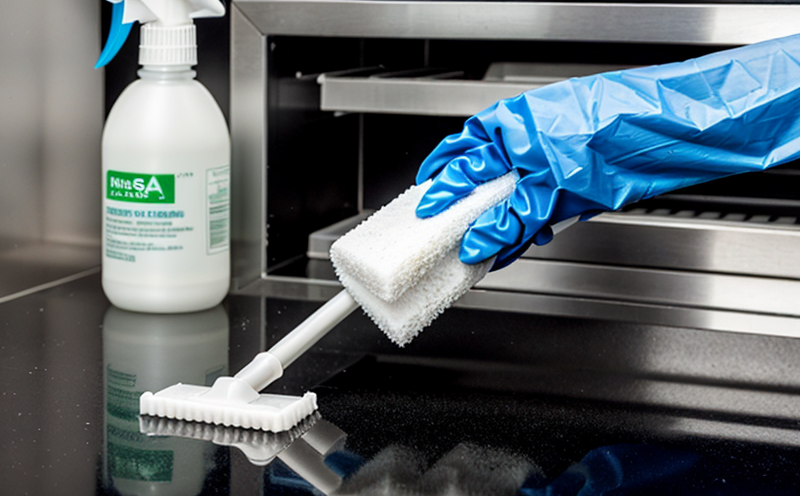ASTM E1153 Sanitizer Testing of Plastics in Food Contact
The ASTM E1153 standard is designed to evaluate plastic materials intended for use in food contact with sanitizers. This testing ensures that the plastics do not transfer harmful substances or chemicals into food products, thereby ensuring consumer safety and compliance with regulatory requirements. The test involves exposing the plastic specimens to a sanitizer solution under specific conditions. The primary goal is to assess whether the material maintains its integrity and does not release any toxic elements when exposed to sanitizers like chlorine dioxide or other commonly used disinfectants.
The testing protocol outlined in ASTM E1153 specifies detailed procedures for preparing test samples, conducting the exposure process, and analyzing the results. Specimens are typically cut from larger pieces of plastic and conditioned according to ISO 62 standard before being exposed to the sanitizer solution. After a specified duration, the specimens undergo visual inspection and chemical analysis to determine if any leachable substances have been released into the test medium.
The significance of this testing lies in its role as a critical quality assurance step for manufacturers of food contact plastics. By ensuring that the materials used do not contaminate food products with harmful chemicals, ASTM E1153 helps prevent potential health hazards associated with plastic use in food packaging and containers.
Quality managers can rely on this testing to maintain high standards of product safety, while compliance officers ensure regulatory requirements are met. R&D engineers benefit from the insights gained through these tests, allowing them to refine materials and processes further. For procurement teams, knowing that suppliers adhere to such rigorous testing protocols provides assurance about the quality and safety of purchased components.
Understanding the nuances of ASTM E1153 is essential for any organization dealing with plastic products in food contact applications. The test not only guarantees product safety but also enhances brand reputation by demonstrating commitment to public health and well-being.
- Visual Inspection: Evaluates physical changes due to exposure.
- Chemical Analysis: Detects any leachable substances released into the test medium.
- Material Integrity: Ensures no significant degradation of the plastic material.
The process of ASTM E1153 involves meticulous preparation and observation, making it a cornerstone in ensuring food safety. By adhering to these stringent tests, manufacturers can build trust with consumers and regulatory bodies alike.
Applied Standards
The ASTM E1153 standard is part of the broader family of materials testing standards developed by ASTM International (formerly known as American Society for Testing and Materials). This particular standard focuses specifically on evaluating plastic materials used in food contact with sanitizers. It aligns closely with other relevant international standards such as ISO 62, which governs environmental conditions for material testing.
The application of ASTM E1153 ensures that the testing methodologies are consistent across different laboratories worldwide, promoting reliability and comparability of results. Compliance with these standards is crucial for manufacturers seeking to ensure their products meet stringent safety requirements set by regulatory authorities like FDA (Food and Drug Administration) in the United States or similar bodies internationally.
By adhering to ASTM E1153, organizations demonstrate their commitment to producing safe and reliable food contact plastics. This not only enhances market credibility but also fosters consumer confidence, which is vital for maintaining long-term relationships with both customers and regulatory agencies.
Eurolab Advantages
EuroLab offers comprehensive services for ASTM E1153 testing, providing clients with accurate results through state-of-the-art facilities and experienced personnel. Our laboratories are equipped with high-precision instruments capable of measuring even the slightest changes in plastic properties after exposure to sanitizers.
Our team of experts ensures that every test adheres strictly to the ASTM E1153 standard, guaranteeing reliability and consistency across all our services. We offer quick turnaround times for results, enabling businesses to make informed decisions promptly. With us, you can trust in the quality and accuracy of our testing processes.
EuroLab’s commitment to excellence extends beyond just meeting standards; it involves going above expectations by providing additional support and advice where needed. Our dedicated professionals are always available to discuss your specific needs and ensure that all aspects of ASTM E1153 testing are covered comprehensively.





